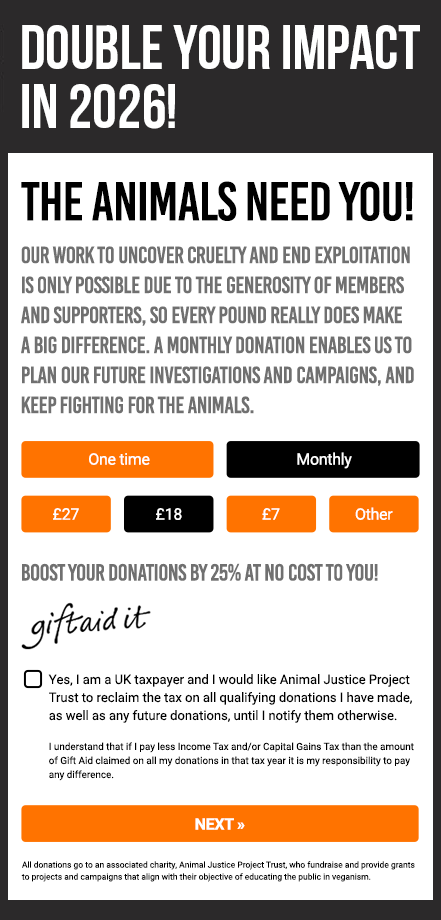
General
Which UK laws 'protect' animals?

Blog written by Claire Hamlett, a freelance journalist and contributor
Several legal cases have been brought against the British government recently for various failures to protect animals. Cruelty Free International lost a high court challenge to the government for “secretly” abandoning a ban on testing cosmetic product ingredients on animals. The Humane League has brought a High Court legal challenge against the government for breaching animal welfare regulations by allowing farmers to keep fast-growing breeds of 'frankenchickens'.
The government has claimed in both cases that it has done nothing wrong (Defra has argued that fast-growing chicken breeds are not inherently at risk of health problems) and touted, as usual, its “high animal welfare standards”. But this, along with the abandonment of a range of new animal protection laws that were expected to be adopted in 2022, makes it hard to follow what the state of animal welfare legislation in the UK actually is. So here is a brief guide to help make sense of where various pieces of legislation currently stand. The primary piece of legislation relating to animal welfare is the Animal Welfare Act 2006.
Animal experimentation
Since 1998, it has been illegal to test completed cosmetics (e.g. eyeshadow or lipstick) and their ingredients on animals or to market cosmetic products and ingredients that had been tested on animals.
But in 2021, the government said it would align with a new rule brought in by the European Chemicals Agency (ECHA), an EU agency which oversees chemical regulation, requiring companies to test some ingredients used in cosmetics on animals to make sure they were safe. This change in policy triggered the legal action by Cruelty Free International. The High Court rejected the case because the chemical regulations cover testing ingredients used in cosmetics on animals to examine environmental impact or worker safety when there are ‘no non-animal alternatives’.
In medical research, potential completed medicines and their ingredients must be tested in animals before human trials can begin. There is a policy of “replacement, reduction and refinement” to minimise the number of animals used in medical trials and avoid using them where possible, known as the “3Rs”.

Animals who are farmed
There are different regulations for each species of animal on British farms, but here are some key laws over which there can be confusion, thanks in part to industry marketing and political lauding of welfare standards that can mislead the public. In addition to the legal requirements of care provided by the Animal Welfare Act 2006, the welfare of animals who are farmed is covered by The Welfare of Farmed Animals (England) Regulations 2007 (as amended).
Cages
Cages are still legal in some contexts on UK farms. Barren battery cages for egg-laying hens were banned in the EU in 2012, but ‘enriched’ cages, which provide a little more space per bird and include things like perches to supposedly help them express more natural behaviours, are still permitted. Chickens raised for meat are kept in large sheds or are ‘free-range’, meaning they may have outdoor access.
Cages known as farrowing crates are also used on pig farms. Pregnant sows are put into them shortly before birth and can be kept in them for up to five weeks, until the piglets are weaned. They are barred metal cages that prevent the sows from turning around and only allow them to move a little forwards and backwards.

Transport
The Welfare of Animals (Transport) (England) Order 2006 is the main piece of legislation relevant here (each nation in the UK has its own version). Pigs can be transported for up to 24 hours without rest. For sheep and cows it’s 28 hours with one hour of rest in the middle of the journey. For unweaned lambs, piglets, and calves it’s 18 hours with an hour of rest in the middle. Temperatures must be controlled for journeys longer than 12 hours, but can reach as high as 35 degrees celsius.
The Kept Animals Bill, which is currently passing through parliament, has a clause that would ban the live export of animals (except poultry) for slaughter or fattening. Animals who, under this bill, could not be exported for slaughter or fattening (i.e. pigs, cows, horses, sheep, and goats) could still be exported for breeding purposes. Though, we have shown that this new legislation would only protect around 4% of animals who are live exported.

Slaughter
Animals in the UK must be stunned before slaughter (apart from religious slaughter like halal or kosher), restrained for as short a time as possible, and not handled “in a way that causes it pain or suffering.” Stunning can be done by penetrative captive bolt–used on cows, sheep and some pigs; an electrical current sent through the brain of sheep, calves and pigs; with gas–this is used to stun pigs and is also used on the majority of poultry to kill them outright. Footage recently captured by animal activist Joey Carbstrong of pigs being gassed with carbon dioxide shows the violent reality of what this is like for pigs.
Animal slaughter is regulated by The Welfare of Animals at the Time of Killing (England) Regulations 2015. Despite this law, our Scammed! campaign highlights how the system is built to fail animals and animals are regularly not stunned for the allotted amount of time and suffer greatly as a result.

Animals abroad
The Animals Abroad Bill was supposed to be introduced in 2022 and ban the import of foie gras hunting trophies and fur. While the ban on hunting trophies (body parts of animals like elephants and giraffes hunted abroad) has been approved by parliament and is now to be debated in the House of Lords, the bans on foie gras and fur have been shelved.
As always,
For the animals.

.png)


.png)













.png)